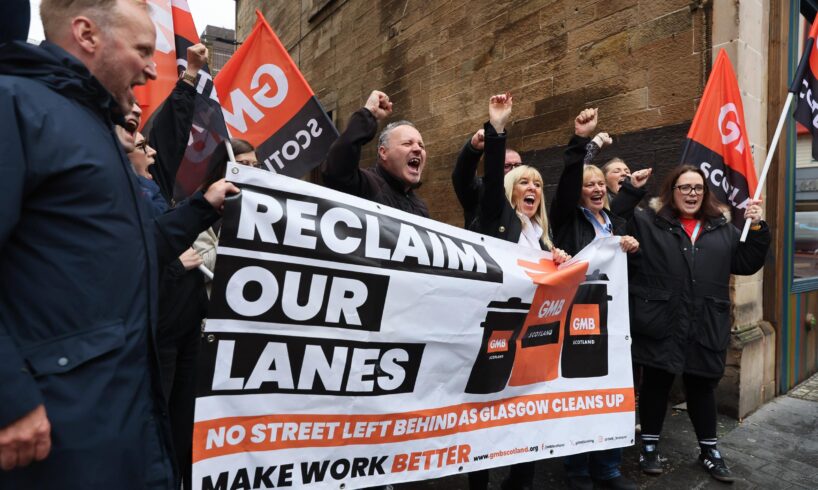
The campaign comes months after Glasgow City Council announced a £6.5 million investment into cleansing services which included the creation of 200 new posts in street cleansing and parks operations. Despite the recent cash boost, union leaders said commercial waste remains unmanaged, leaving a network of “abandoned side streets” that pose a “public health hazard”.
GMB Scotland launches their Reclaim Our Lanes campaign for a cleaner Glasgow. Members of the GMB(Image: Colin Mearns)
Gary Smith poses as GMB Scotland launches their Reclaim Our Lanes campaign for a cleaner Glasgow.(Image: Colin Mearns)
Gary Smith, GMB’s general secretary, said the state of the city’s back lanes reflect years of “denial” and “underinvestment” from the local authority.
He said: “Glasgow City Council was in denial about the state of the city for a decade. They said there was not a problem with refuse and street cleaning, but the place was in a state because of cuts.”
Mr Smith said that despite the success of GMB’s campaign for further cleansing investment, commercial waste in Glasgow remains “a disgrace” and dubbed the state of the lanes as “shameful”. “These should be a public asset, instead they are a public health hazard.”
The union’s blueprint for bins calls for a deep clean of the back lanes, stricter enforcement of private commercial waste operators, and the expansion of council-run commercial waste services.
Keir Greenaway, GMB Scotland senior organiser in public services, said: “The benefits are potentially huge for the council, for the city and for taxpayers.
“The city is cleaner, the council makes money by taking back commercial contracts, and taxpayers no longer subsidise businesses and their private waste operators failing to meet required standards.”
GMB Scotland launches their Reclaim Our Lanes campaign for a cleaner Glasgow.(Image: Colin Mearns)
Chris Mitchell, GMB convenor for Glasgow’s cleansing and refuse workers.(Image: Colin Mearns)
For Chris Mitchell, GMB convenor for Glasgow’s cleansing and refuse workers, the Reclaim the Lanes campaign is inseparable from the city’s commercial waste contract which is coming up for renewal next year. He claimed that it could be under threat if the budget was cut and wants to see the council’s commercial contract expanded. The city could be better off if the council was responsible for more commercial contracts, he said.
“We could have the lanes cleaned up within two months,” Mitchell said. “The staff, vehicles and expertise are all in place. We’re ready to go. What we need now is for the council to work with us, not against us. If they give us the chance, we can deliver a cleaner city that benefits residents, businesses, the council itself and our members.”
Mr Mitchell added: “It’s a win-win situation for everybody. I would encourage all of these commercial properties to use our contract which is a first-class service for the city.”
There are nearly a dozen commercial operators with contracts to life commercial waste in the city centre. There are nine enforcement officers – with one supervisor – for the city, and four of the nine have recently been recruited.
The campaign includes an action plan to be presented to councillors and officials, proposing regular uplifts, monitoring of new bin hubs, deep cleaning of lanes, and tighter enforcement of fly-tipping and dumping. Union organisers argue that a co-ordinated approach could transform neglected lanes into safe, usable public spaces while safeguarding jobs and supporting businesses.
A spokesperson from Glasgow City Council said the authority was exploring where improvements could be made in terms of the presentation of commercial waste collection times in the city centre.
Speaking at the campaign launch in Sauchiehall Lane alongside workers, Mr Smith said that while he is “okay” with private companies uplifting commercial waste, enforcement was “not working”.
He said: “We have got a very good in-house commercial waste provision in Glasgow and that could be expanded but it needs investment.
“There are two things that need to happen – we need investment in the inhouse service, and we need enforcement of the private contractors and with the companies who are frankly dumping waste in these lanes. It’s disgusting.”
Rubbish in Sauchiehall Lane.(Image: Colin Mearns)
A Glasgow City Council spokesperson said: “The enforcement team continue to enforce and offer advice and guidance to deal with offences. The number of Commercial Waste Enforcement Officers in the city has almost doubled recently.”
Mr Smith said: “Any other city in Europe would be celebrating these lanes, would be using them as facilities, we would be bringing them to life with bars and cafes, bringing business and investment into the city. This would help us with economic growth.”
It is hard to imagine Glasgow’s rubbish-strewn lanes as a European al-fresco dining paradise. “As a start, lets actually get the rubbish into the bins,” says Mr Smith. “If there are businesses or individuals who are not complying with the rules, there needs to be proper enforcement, there needs to be action taken.
“It’s time for the city council, the administration in Glasgow, to open its eyes and face the scandal of the state of the lanes.”
Marissa MacWhirter is a columnist and feature writer at The Herald, and the editor of The Glasgow Wrap. The newsletter is curated between 5-7am each morning, bringing the best of local news to your inbox each morning without ads, clickbait, or hyperbole. Oh, and it’s free. She can be found on X @marissaamayy1





